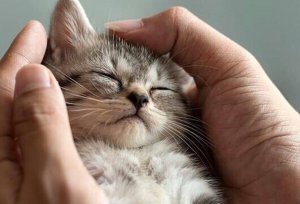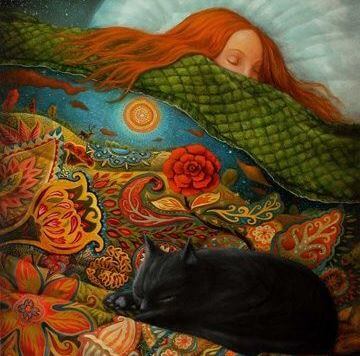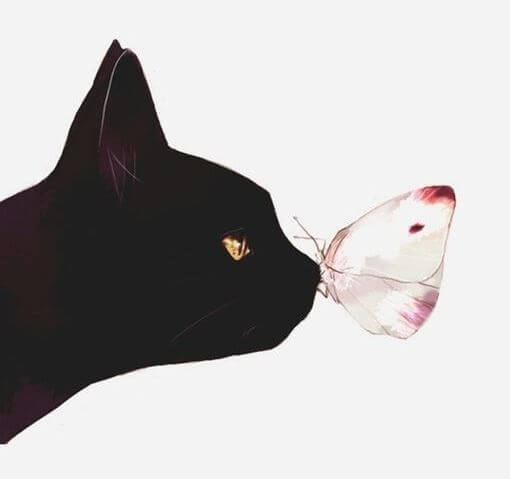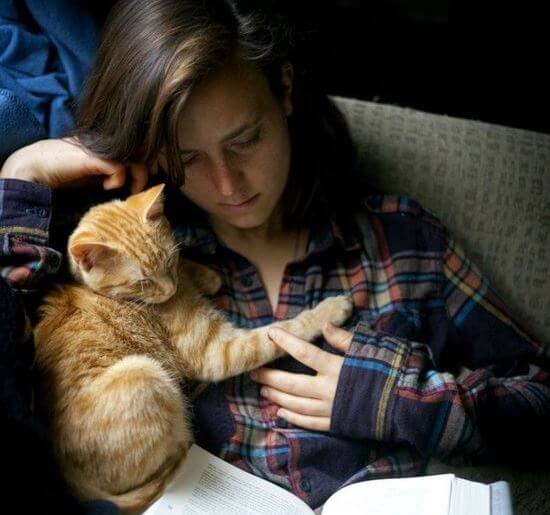Time Spent With Cats Is Never Time Wasted

“Time spent with cats is never time wasted.”
-Sigmund Freud-
This quote from the father of psychoanalysis tells us something that most of us undoubtedly already know. However, sometimes something that is so ordinary, like spending time with cats, can reach a therapeutic level because it’s so comforting.
One good example comes from Japan. In that country, cats are both admired and respected. They’re a symbol of good luck, and the Japanese pioneered the development of centers called “cat cafes,” which can now be found all around the world.
The first “cat cafe” opened in Taiwan in 1998. The purpose? Very simple. Japan is a very industrialized and work-oriented country. Work days are very intense and it’s common to suffer from stress and other emotional shortcomings that must be released.
Petting a cat is a cathartic act. It regulates stress, improves cardiovascular health, soothes the mind, and offers a sincere opportunity to express affection and to be captivated by one of the most interesting domesticated animals. (Or maybe it’s the other way around, who knows?).
Let’s delve into feline psychology to understand a little more about what these animals can offer us.
Their beauty attracts you and their personality captivates you
Cats, unlike dogs, don’t belong to anyone but themselves. It’s us who become captivated by their art, their leadership, their divine charm, their understanding of space, and a love that is not dependent, but absolutely faithful.
You could really write an entire book about cat psychology. And while people always say they’re selfish and independent, in reality, that’s not always completely true. Hence their interesting nature, hence the intrigue they provoke in us.
Cats will love, respect, and defend us like we’re their own family. They are possessive when it comes to their space, their routines, and their owners, however they know how to keep their distance without suffocating us or depending completely on us.
They enjoy being pampered and adored. They seek daily affection, but they demand limits, and will show you in a demonstration of their elegance and independence. Sure, they draw attention with the brightness of their eyes, or their therapeutic and soothing purr, but what we like the most about cats is their personality.

We live in a world marked by sometimes useless priorities that detach us from what is really important: the light of the sun, peace, ourselves, our loved ones…
We wrap ourselves in artifice, in unimportant problems. We accumulate things and lose sight of experiences and emotions…
For cats, the world turns at the proper rhythm. Life is leisurely, measured by moments resting in the sun, laying next to us on the couch, going on excursions to learn and feed their curiosity. They are wise creatures that open their eyes to the world like windows full of light and hope.
It is sometimes said that cats are well-versed in the world of yoga. They can spend long hours meditating in front of a window or a bowl of water. What truths do they sense? What realities do they see that escape human senses?
They spend time sitting immobile in their own world, going from introspection to action in less than a second. They go from reflection to activity so rapidly that they leave us breathless and in awe.
What’s endearing is that everything they do, they do with all their senses, of which there are surely not 5, but 6, because their intuition, their ability to jump to our lap when we really need it, is without a doubt a virtue that only cats have.
It’s not just crazy people who have cats
Who was it who said that crazy people will end up with 100 cats? Cats are wise and serene creatures that make life richer, simpler, and more interesting for anyone who lives with these animals with such great personalities.
They’re ideal for both children and elderly people. They’re faithful companions to spend quiet afternoons with and relax in bed with. They’re excellent friends to live with and learn from every day.
“Cats are sovereign individuals, with their own ideas about things, and this includes their owners.”
-John Dingman-
“Time spent with cats is never time wasted.”
-Sigmund Freud-
This quote from the father of psychoanalysis tells us something that most of us undoubtedly already know. However, sometimes something that is so ordinary, like spending time with cats, can reach a therapeutic level because it’s so comforting.
One good example comes from Japan. In that country, cats are both admired and respected. They’re a symbol of good luck, and the Japanese pioneered the development of centers called “cat cafes,” which can now be found all around the world.
The first “cat cafe” opened in Taiwan in 1998. The purpose? Very simple. Japan is a very industrialized and work-oriented country. Work days are very intense and it’s common to suffer from stress and other emotional shortcomings that must be released.
Petting a cat is a cathartic act. It regulates stress, improves cardiovascular health, soothes the mind, and offers a sincere opportunity to express affection and to be captivated by one of the most interesting domesticated animals. (Or maybe it’s the other way around, who knows?).
Let’s delve into feline psychology to understand a little more about what these animals can offer us.
Their beauty attracts you and their personality captivates you
Cats, unlike dogs, don’t belong to anyone but themselves. It’s us who become captivated by their art, their leadership, their divine charm, their understanding of space, and a love that is not dependent, but absolutely faithful.
You could really write an entire book about cat psychology. And while people always say they’re selfish and independent, in reality, that’s not always completely true. Hence their interesting nature, hence the intrigue they provoke in us.
Cats will love, respect, and defend us like we’re their own family. They are possessive when it comes to their space, their routines, and their owners, however they know how to keep their distance without suffocating us or depending completely on us.
They enjoy being pampered and adored. They seek daily affection, but they demand limits, and will show you in a demonstration of their elegance and independence. Sure, they draw attention with the brightness of their eyes, or their therapeutic and soothing purr, but what we like the most about cats is their personality.

We live in a world marked by sometimes useless priorities that detach us from what is really important: the light of the sun, peace, ourselves, our loved ones…
We wrap ourselves in artifice, in unimportant problems. We accumulate things and lose sight of experiences and emotions…
For cats, the world turns at the proper rhythm. Life is leisurely, measured by moments resting in the sun, laying next to us on the couch, going on excursions to learn and feed their curiosity. They are wise creatures that open their eyes to the world like windows full of light and hope.
It is sometimes said that cats are well-versed in the world of yoga. They can spend long hours meditating in front of a window or a bowl of water. What truths do they sense? What realities do they see that escape human senses?
They spend time sitting immobile in their own world, going from introspection to action in less than a second. They go from reflection to activity so rapidly that they leave us breathless and in awe.
What’s endearing is that everything they do, they do with all their senses, of which there are surely not 5, but 6, because their intuition, their ability to jump to our lap when we really need it, is without a doubt a virtue that only cats have.
It’s not just crazy people who have cats
Who was it who said that crazy people will end up with 100 cats? Cats are wise and serene creatures that make life richer, simpler, and more interesting for anyone who lives with these animals with such great personalities.
They’re ideal for both children and elderly people. They’re faithful companions to spend quiet afternoons with and relax in bed with. They’re excellent friends to live with and learn from every day.
“Cats are sovereign individuals, with their own ideas about things, and this includes their owners.”
-John Dingman-
This text is provided for informational purposes only and does not replace consultation with a professional. If in doubt, consult your specialist.








